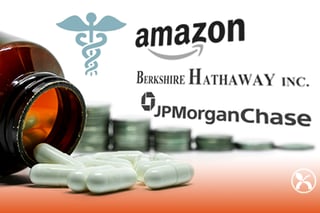Just 18 months ago, Quartz Media described Amazon as a “titan of e-commerce, logistics, payments, hardware, data storage, and media,” and added, “It dabbles in plenty more industries.” On January 30, 2018, we learned of yet another industry to be disrupted by Amazon: health care.
 Powerhouse Partnership
Powerhouse Partnership
Amazon has joined forces with Berkshire Hathaway and JPMorgan Chase & Co. in a partnership that immediately drove stocks down for large health insurers and pharmaceutical companies. Even Aetna, which expected profits after its merger with CVS Health, saw a dip in earnings.
And with good reason. The three companies have taken aim at one of the largest systems in the United States. And it’s a move that has upped the ante for the entire healthcare space. The partnership could very well introduce a new era in health care.
They’re in it for the long haul.
When Berkshire Hathaway Chairman and CEO Warren Buffett shared his investment philosophy with Forbes, he revealed his predilection for doing business with companies that are willing to endure low profit to achieve an end goal.
His investment strategy: “…find a good business--and one that I can understand why it's good--with a durable, competitive advantage, run by able and honest people, and available at a price that makes sense. Because we're not going to sell the business, we don't need something with earnings that go up the next month or the next quarter; we need something that will earn more money 10 and 20 and 30 years from now. And then we want a management team we admire and trust.”
That describes Amazon exactly. The e-commerce company has a history of slashing prices and focusing on customer satisfaction for as long as it takes to achieve customer loyalty and business domination within a specific space, such as data storage and hit movies.
CEO and founder Jeff Bezos has proven he is content with low profit margins. And now he, along with Buffett and JPMorgan Chase Chairman and CEO Jamie Dimon have combined forces to reinvent health care for their U.S. employees “with the aim of improving employee satisfaction and reducing costs.”
That concept isn’t new. Many companies are self-insured, meaning they pay employee medical claims directly rather than using a traditional health insurance company. You can read more about the concept here.
Amazon partnership plans to leverage technology and slash prices.
In announcing their foray into health care, the three men made it clear that the new company will be “free from profit-making incentives and constraints.” And not just for their collective companies.
“The ballooning costs of healthcare act as a hungry tapeworm on the American economy. Our group does not come to this problem with answers. But we also do not accept it as inevitable. Rather, we share the belief that putting our collective resources behind the country’s best talent can, in time, check the rise in health costs while concurrently enhancing patient satisfaction and outcomes,” said Buffett.
“The three of our companies have extraordinary resources, and our goal is to create solutions that benefit our U.S. employees, their families and, potentially, all Americans,” Dimon added.
It’s not clear exactly how the as-yet unnamed company will accomplish its goal of lowering healthcare costs by 20 percent, but the “initial focus” will be on “technology solutions that will provide U.S. employees and their families with simplified, high-quality, and transparent health care at a reasonable cost,” according to their January 30 press release.
Innovation and lifestyle changes are the future of health care.
As the new partnership looks to efficiencies and technology to control costs and increase satisfaction within the healthcare sector, it’s also important that they focus on population health through lifestyle change.
“One of the best ways to control healthcare costs is to identify risk factors before clinical data indicates disease,” says Dr. Joe Raphael, Wellsource Director of Research and Development. “Our health risk assessment identifies upstream risks, enabling healthcare practitioners to devise a wellness plan that drives behavior change and disrupts the progression toward chronic disease.”
Nutrition, exercise, sleep, stress reduction, social connection, mindfulness, and other trending topics can establish the infrastructure for preventing or controlling chronic diseases.
How do you tell which two factors will have the most impact on your population?
- Gather the information needed to design a personalized population health plan.
- Analyze the data as a way to control costs. (Your population’s health risks will guide the development of lifestyle-targeted interventions.)
- Determine measurable outcomes.
- Implement lifestyle change efforts in innovative ways.
What else is on the horizon for the future of healthcare and population health? Read our 2018 predictions in our recent blog post.








